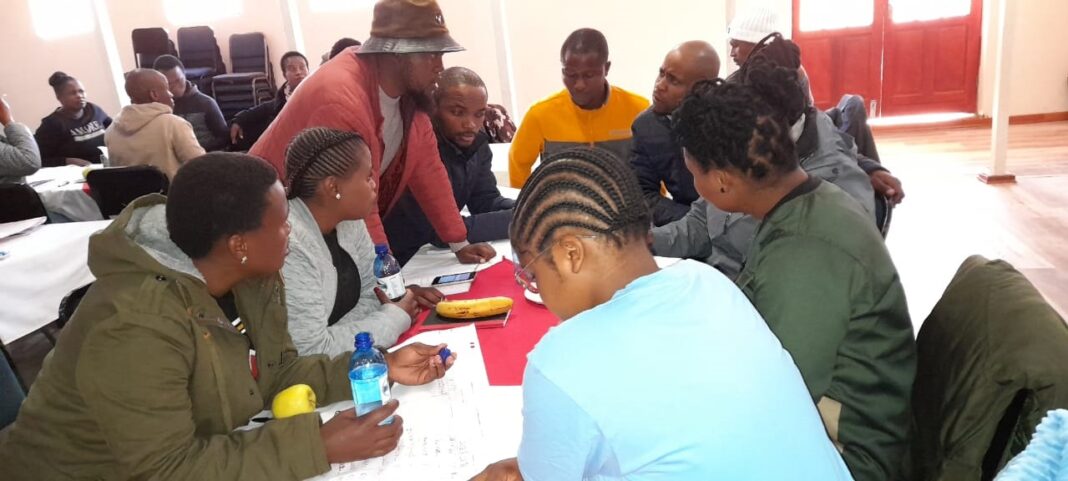Kabelo Masoabi
Irrespective of the business and market size, conducting an all-inclusive marketing analysis at regular intervals is a thing all business owners must adopt, farmers were told.
The business tips are said would provide knowledge of the consumer needs for a product or service the farming business is offering.
The Business 101 information was the core of the Smallholder Agriculture Development Project (SADP) II’s business development training for local farmers in agribusiness.
The objective was to give farmers a clearer understanding of the importance of enterprise budget and marketing analysis.
The three-day workshop that started on the July 18 was attended by over 35 farmers from Berea, Leribe and Butha-Buthe.
“This exercise is designed for farmers keen to professionalise their operations and the overall goal is for farmers to learn how best to minimise threats and maximise their profits.
“At the end of this training, the farmers will be able to routinely track and monitor their income, savings and expenditures, including farm investments,†Mr Vuca Tšabo, a researcher with the Ministry of Agriculture and Food Security and Nutrition said.
From the training, emerging entrepreneurs learned skills aimed at helping them to better manage their finances and diversify their businesses.
TÅ¡abo during his presentation stressed that keeping better records of income and expenditure would enable the farmers to get a better insight into their finances and make better investments to grow their business income.
Further indicating the significance of marketing analysis, TÅ¡abo said by conducting exercises around market knowledge would also help determine the trends within the market and understand the needs before introducing new products or redesigning an existing product.
“As a business owner, gathering market data should be an ongoing process to be successful. Marketing analysis is the process of monitoring and evaluating market trends. In short, the process of this analysis is aimed at determining the suitability of products or services within a specified market and how the product can be sold.
“Marketing analysis also focuses on the behaviour of consumers to determine their pattern of buying because the market situation changes from time to time,†he explained.
Depending on business goals, the following were some of the key elements listed to carry out a marketing analysis:
- understanding of the market and customers (who buys?)
- Understanding the market size and market share (How much do they buy?)
- Taking note of pricing and profitability (What are the current market prices?)
- Conducting situational analysis (What will give my produce the edge over competitors?
- Understanding customer lifetime value (formal market versus informal market)
- Understanding the break-even point (the minimum level of sales that must be achieved to generate a profit)
- Knowing the promotional advertisement or message to be used
- Knowing the channel of distribution
- And Knowing what opportunities exist within the market
“This analysis is important because some farmers either have no idea of who will buy from them, or they assume that ‘everyone’ will. Such assumptions can lead to wrong decisions, wrong pricing, wrong market strategy and ultimately business failure,†Tšabo warned.
Participating farmers were also introduced to SWOT analysis which is a framework for identifying and analysing a business’s strengths, weaknesses, opportunities and threats analysis.
The primary goal of SWOT analysis according to TÅ¡abo is to increase awareness of the factors that go into making a business decision or establishing a business strategy. This ensures that marketing strategies perform according to expectations.
“For other districts to develop to the level of Maseru and more, we the trainees must bring the market closer to our production areas and that is what we have also learnt from the workshop,†‘Mapontšo Mosili, a participating farmer said.
She indicated that with the SADP II grants opportunities, all participating farmers are eyeing the designated financial support and needed the information to make better financial decisions in commercialising their farming activities.
Supported by the World Bank, the SADP II program provides tools farmers need to adopt climate-smart agriculture technologies to increase the size, diversity, and resilience of their crops, and to take advantage of the new market opportunities.
Figures by the World Bank show that up to date, the SADP project has provided more than 800 grants and has reached over 78, 000 beneficiaries through the competitive grant program and other capacity-building activities to improve agriculture productivity, income generation, and job creation in Lesotho.
Over $57 million (M1 billion) has been invested in the SADP II by the World Bank, the Japanese government and the government of Lesotho.




